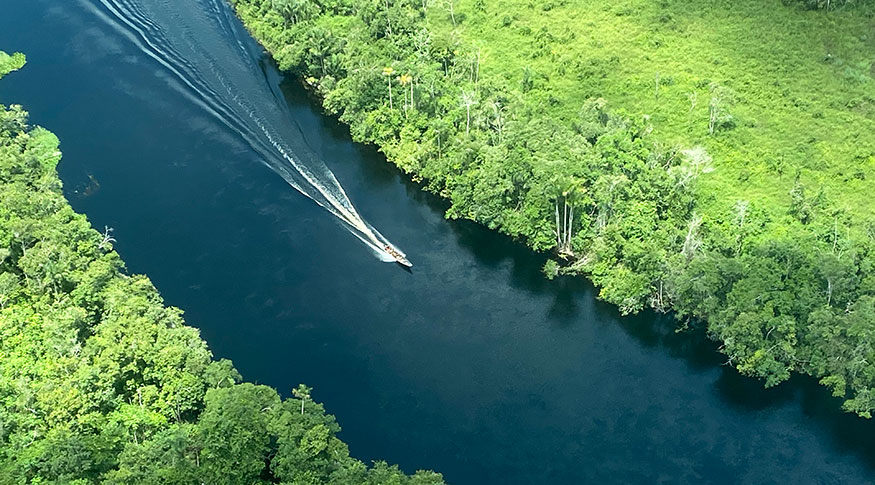Environment Statistics
IBGE releases publication on recommendations to systematize Environment and Climate Change Statistics
October 30, 2024 10h00 AM | Last Updated: November 05, 2024 12h34 PM
Highlights
- This publication, a text for discussion, aims at fostering reflection on governance strategies to systematize and improve environment and climate change statistics in Brazil.
- The study conducted a preliminary survey using two tools that have as a reference the Framework for the Development of Environment Statistics - FDES and the Global Set of Climate Change Statistics and Indicators, approved, respectively, in 2013 and in 2022, by the United Nations Statistical Commission.
- Besides the IBGE, many institutions generate statistics and indicators on these topics. peration about these issues. For that reason, it is of fundamental importance to conduct a more thorough evaluation of these entities. That will facilitate the qualification and development of new strategies in the interinstitutional cooperation demanded by this agenda.
- Based on this preliminary evaluation, the IBGE will invite other institutions engaged in the production of data to reflect and join efforts towards the development of a group of statistics and indicators for the national scenario. Therefore, other areas of statistical production, such as economic environmental accounts, will benefit from this cooperation.
- By bringing together in one same institute the production of statistical and geoscientific data, the IBGE has the necessary conditions for the implementation of comprehensive thematic coverage proposed and to suggest necessary actions for the elaboration of a cooperative work plan.

According to the IBGE’s director of Geosciences, Ivone Lopes Batista, the UN Statistical Commission has guided national statistical offices in the management of environment and climate change data. “The publication unveils new paths, both in terms of institutional arrangements and of data treatment as a long-terms asset that can benefit society.”
Besides the main international frameworks on the organization of environment statistics, which constitute a multidimensional, complex and cross-cutting area, concepts related to standardization, interoperability and metadata within the scope of official statistics are presented. They are essential to guarantee standards and compliance tools to provide geospatial and statistical information in an integrated way.
When the legal framework of official statistics and the institutional context of the environmental policy and of climate emergence in the country are considered, it becomes clear there is a great challenge of generating environment statistics, as this is a cross disciplinary and interinstitutional process. Given this complex institutional framework, which is related to a number of public policies, Governance with a clear coordination and cooperation model, with legal instruments and proper budget is necessary. The creation of a collegiate instance, a space for the coordination of environment statistics, is thus proposed.
According to the Environment Coordinator, Therence de Sarti, the text will be the basis for a series of later discussions with producers of environmental data in Brazil, including the Ministry of the Environment, for governance of data. “It presents a series of information on fundamental principles, necessary requirements and governance-related suggestions so that the environmental data have quality and credibility. The text also brings preliminary results on the state-of-the art existence of these data in Brazil, based on two important international frameworks. .
ESSAT and CISAT tools indicate environmental statistics available
The study presented a preliminary survey using two tools from the United Nations Statistics Division – UNSD: 1- Environment Statistics Self-Assessment Tool - Essat (United Nations, 2016), which uses as a reference the Framework for the Development of Environment Statistics - FDES 2013 (United Nations, 2018), and 2 - Climate Change Statistics and Indicators Self-Assessment Tool - Cisat (United Nations, 2023), which has as a reference the Global Set of Climate Change Statistics and Indicators, adopted by the United Nations Statistical Commission in 2022 (United Nations, 2022).
Besides IBGE, other institutions generate statistics and indicators about these topics. As most of the information comes from administrative records, it is important to consider the improvement of sharing protocols with the network of producers of official statistics. One of the main gaps identified in statistics and indicators refers to methodological omissions and metadata.
The proposal for coming steps includes a detailed assessment of data survey using the Essat and Cisat tools, with the collaboration of institutions that produce environment and climate change statistics. That will allow the qualification and development of new work strategies regarding administrative records provided by other bodies and found in statistics produced by IBGE.
Governance strategies to meet the demands of society
The ongoing discussions at the IBGE and that have led to the conduction of the National Conference of Data Producers and Users (between July 29 and August 02) represent an opportunity to suggest and reflect upon a new governance model for environment statistics in Brazil.
The agenda demands new interinstitutional cooperation strategies. We suggest the creation of a collegial instance as a space for the coordination of environment statistics, with access to legal and budgetary devices. That can facilitate the development of a medium and long-term plan of environment and climate change statistics. Therefore, other areas of statistical production, such as environmental-economic statistics, can benefit from this cooperation.
By means of the content presented, the IBGE invites data producers and users for a participating reflection aimed at the development of a group of national statistics and indicators. Facing climate emergencies and social and environmental disasters demands the structuring of environment statistics, about which Brazil has a number of sources that, when properly coordinated, may result in multiple benefits for the parties.
The IBGE Manager of Environment Accounting and Statistics, Sandra De Carlo, highlights the importance of working with other institutions. “Gathering the production of both statistical and scientific data in one same institute, the IBGE has the conditions for the implementation of the proposed theme and suggest necessary for the elaboration of a joint work plan.”




















